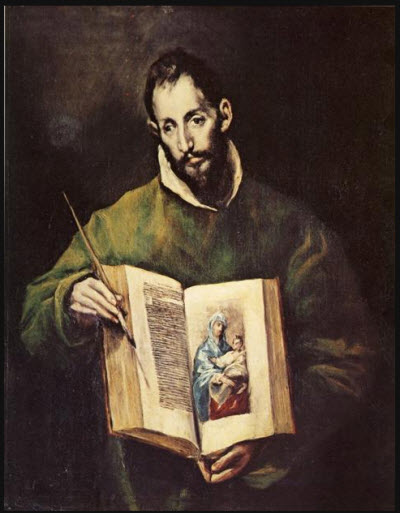Luke 3:23 And Jesus himself began to be about thirty years of age, being (as was supposed) the son of Joseph, which was the son of Heli, - Free Bible Online
Luke 3:23 And when He began His ministry, Jesus Himself was about thirty years of age, being supposedly [the] son of Joseph, the [son] of Eli,
Lu 3:23-38. GENEALOGY OF JESUS.
23. he began to be about thirty--that is, "was about entering on His
thirtieth year." So our translators have taken the word (and so CALVIN,
BEZA,
BLOOMFIELD,
WEBSTER and
WILKINSON, &c.): but "was about thirty
years of age when He began [His ministry]," makes better Greek, and
is probably the true sense [BENGEL,
OLSHAUSEN,
DE
WETTE,
MEYER,
ALFORD,
&c.]. At this age the priests entered on their office
(Nu 4:3).
being, as was supposed, the son of Joseph, &c.--Have we in this
genealogy, as well as in Matthew's, the line of Joseph? or is this
the line of Mary?--a point on which there has been great difference
of opinion and much acute discussion. Those who take the former opinion
contend that it is the natural sense of this verse, and that no
other would have been thought of but for its supposed improbability and
the uncertainty which it seems to throw over our Lord's real descent.
But it is liable to another difficulty; namely, that in this case
Matthew makes Jacob, while Luke makes "Heli," to be Joseph's
father; and though the same man had often more than one name, we ought
not to resort to that supposition, in such a case as this, without
necessity. And then, though the descent of Mary from David would be
liable to no real doubt, even though we had no table of her line
preserved to us (see, for example,
Lu 1:2-32,
and see on
Lu 2:5),
still it does seem unlikely--we say not incredible--that two
genealogies of our Lord should be preserved to us, neither of which
gives his real descent. Those who take the latter
opinion, that we have here the line of Mary, as in Matthew that
of Joseph--here His real, there His reputed
line--explain the statement about Joseph, that he was "the son
of Hell," to mean that he was his son-in-law, as the husband of
his daughter Mary (as in
Ru 1:11, 12),
and believe that Joseph's name is only introduced instead of Mary's, in
conformity with the Jewish custom in such tables. Perhaps this view is
attended with fewest difficulties, as it certainly is the best
supported. However we decide, it is a satisfaction to know that not a
doubt was thrown out by the bitterest of the early enemies of
Christianity as to our Lord's real descent from David. On
comparing the two genealogies, it will be found that Matthew, writing
more immediately for Jews, deemed it enough to show that the
Saviour was sprung from Abraham and David; whereas Luke, writing more
immediately for Gentiles, traces the descent back to Adam, the
parent stock of the whole human family, thus showing Him to be the
promised "Seed of the woman." "The possibility of constructing such a
table, comprising a period of thousands of years, in an uninterrupted
line from father to son, of a family that dwelt for a long time in the
utmost retirement, would be inexplicable, had not the members of this
line been endowed with a thread by which they could extricate
themselves from the many families into which every tribe and branch was
again subdivided, and thus hold fast and know the member that
was destined to continue the lineage. This thread was the hope that
Messiah would be born of the race of Abraham and David. The ardent
desire to behold Him and be partakers of His mercy and glory suffered
not the attention to be exhausted through a period embracing thousands
of years. Thus the member destined to continue the lineage, whenever
doubtful, became easily distinguishable, awakening the hope of a final
fulfilment, and keeping it alive until it was consummated" [OLSHAUSEN].
JFB.
Questions Related to this Verse
Where In Scripture does it talk about God becoming a man?Where in Scripture does it talk about The incarnation of the Lord Jesus Christ?
Select a Chapter
-
Luke 1 |
Luke 2 |
Luke 3 |
Luke 4 |
Luke 5 |
Luke 6 |
Luke 7 |
Luke 8 |
Luke 9 |
Luke 10 |
Luke 11 |
Luke 12 |
Luke 13 |
Luke 14 |
Luke 15 |
Luke 16 |
Luke 17 |
Luke 18 |
Luke 19 |
Luke 20 |
Luke 21 |
Luke 22 |
Luke 23 |
Luke 24 |
Select a Book of the Bible
-
Genesis |
Exodus |
Leviticus |
Numbers |
Deuteronomy |
Joshua |
Judges |
Ruth |
1 Samuel |
2 Samuel |
1 Kings |
2 Kings |
1 Chronicles |
2 Chronicles |
Ezra |
Nehemiah |
Esther |
Job |
Psalms |
Proverbs |
Ecclesiastes |
Song of Solomon |
Isaiah |
Jeremiah |
Lamentations |
Ezekiel |
Daniel |
Hosea |
Joel |
Amos |
Obadiah |
Jonah |
Micah |
Nahum |
Habakkuk |
Zephaniah |
Haggai |
Zechariah |
Malachi |
Matthew |
Mark |
Luke |
John |
Acts |
Romans |
1 Corinthians |
2 Corinthians |
Galatians |
Ephesians |
Philippians |
Colossians |
1 Thessalonians |
2 Thessalonians |
1 Timothy |
2 Timothy |
Titus |
Philemon |
Hebrews |
James |
1 Peter |
2 Peter |
1 John |
2 John |
3 John |
Jude |
Revelation |
The Book of Luke
Luke 1:1-4 - Forasmuch as many have taken in hand to set forth in order a declaration of those things which are most surely believed among us, Even as they delivered them unto us, which from the beginning were eyewitnesses, and ministers of the word; It seemed good to me also, having had perfect understanding of all things from the very first, to write unto thee in order, most excellent Theophilus, That thou mightest know the certainty of those things, wherein thou hast been instructed.
Luke 2:49 - And he said unto them, How is it that ye sought me? wist ye not that I must be about my Father's business?
Luke 19:42 - Saying, If thou hadst known, even thou, at least in this thy day, the things [which belong] unto thy peace! but now they are hid from thine eyes.
Luke in The New Testament - A Brief Overview

Painting of St. Luke by El Greco - 1605
Introduction to The Gospel of Luke
The Word Gospel. The third book of the English Bible that most of us read from is the Gospel of Luke. Luke is the third of the four gospel writings, yet there is only one gospel about Jesus Christ and there are four different writers: Matthew, Mark, Luke, and John. The word "Gospel" means "good news", and the good news is about Jesus Christ dying on the cross and then 3 days later conquering death and rising from the dead, offering salvation to all mankind, this is the Gospel.
Summary of The Book of Luke
Brief Summary. Jesus was the most perfect man of all men, the perfect Son of God. Completely devoted to everyone, especially the weak. He was the most humble man that ever lived, and not only a servant, but the lowest slave. He completely put others first before He thought of Himself, the Son of man.
Purpose. Luke seems to portray Jesus as an ideal man, very appealing to the Greek culture which exalted reason, philosophy, the human mind, and beauty. Luke's writings were orderly and classical. he mentions that Jesus spent the whole night in prayer before He chose His apostles (Luke 6:12-16), unlike the other Gospel accounts. There are also statements in Luke that speak of His purity more clearly, like when the centurion said "certainly this was a righteous man" (Luke 23:47). The other Gospel accounts seem to have a different focus in their portrayal of Christ. Luke also seems to reveal Christianity as a religion for all mankind and not just the Jews. For example, the lineage of Jesus is traced past Abraham all the way back to Adam the first man. Jesus is seen in Luke as a friend of sinners and a savior to anyone who would believe in Him. When considering both of Luke's works it is clear that he traces the origin, heart, and description of the Christian movement from Bethlehem to Jerusalem, to Antioch, to Macedonia, to Achaia, to Ephesus, and finally to Rome, the capital of the world. He examined eyewitnesses, knew personally and had close contact with the main followers of Christ like Mark and James, the brother of the Lord, Paul. Silas (a member of the Jerusalem Church) and no doubt many others.
Audience. Luke addressed his account of the life of Christ and the Acts of the Apostles to a man named Theophilus, yet it possesses a style that would appeal to all intelligent gentiles and would certain appeal to any believer. Theophilus could have been a gentile convert to Christianity who desired to know more of the facts surrounding the life of Jesus Christ, possibly a wealthy contributor to Christianity, no one can say for certain. The name Theophilus means "lover of God" and has been supposed by many to be a euphemism for all lovers of God in Christ.
Authorship. The gospel of Luke does not proclaim who the author is within the document, yet the historical information we have from the first two centuries of the Christian Era was unanimous in concluding that the writer was Luke. Luke also wrote the Acts of the Apostles (Acts 1:1) as a continuing document, from the birth of John the Baptist and Jesus to Paul's imprisonment and ministry in Rome.
Date. Since the Book of Acts was written while Paul was in Rome, the date of Acts would be around 62 AD, and since the Gospel of Luke was mentioned as a "former 'treatise," Luke must have been written a few years earlier.
Place. It cannot be determined with certainty where the Gospel of Luke was written. Some of the early Church writers said it was written in Achaia. Many think Acts was most likely written in Rome and therefore Luke must have also. One common speculation is that the Gospel of Luke was written in Caesarea Maritima while Paul was in prison there a couple years before his journey to Rome.
The Man Luke. Luke was a gentile (non-Jew) and was not mentioned during the actual life of Jesus, but afterward he became a Christian under the influence of Paul the Apostle. Luke was described by Paul in his letter to the Church in Colossae as "the beloved physician" (Colossians 4:14). Luke was also mentioned as a companion of Paul on his missionary journeys, and on his third and last missionary journey he said that "only Luke is with me" (2 Timothy 4:11). Luke must have been an amazing man because he claims in the beginning of his account of the life of Christ that he "investigated everything carefully" (Luke 1 :1- 4). This would mean that he would have spoken with eyewitnesses to the miracles and events surround the ministry of Jesus. He was clearly persuaded by the facts that he was told and became a devoted follower of Christ and a companion of Paul until the end. There can be no doubt that Luke was a gentile believer, even his name "Luke" is a gentiloe name. Also in Colossians 4 it mentions the names Epaphras, Demas and Luke in contrast with those "of the circumcision." It is interesting to note that early Church leaders Irenaeus, Tertullian, Origen, and Eusebius mentioned in their writings that Luke was influenced by Paul when he wrote the third Gospel account.
Language. Luke was written in Greek, he was a gentile believer and uses a style similar to other important Greek documents. He uses a popular, non-literary Greek style, omitting Semitic and Latin "barbarisms"; yet, he manifests a rich vocabulary and a high degree of literary artistry, as seen in his ability to sketch the character of an individual in a few graphic strokes of the pen. A noted French philosopher and critic of the Bible called the book of Luke "the most beautiful book ever written."
Historical Trustworthiness. Throughout the history of the Church and especially during the 1800's their has been many targeted attacks on the historical trustworthiness of Luke's writings. As the science of archaeology increased technologically and archaeological discoveries from the first century were being uncovered, Luke's writings were emerged as extremely accurate. Luke has been heralded by many scholars as one of the ablest and most accurate historians of the ancient world.
Outline of the Book of Luke
His Birth, Childhood, Early Ministry - Chapters 1:1-4:13
His Ministry in Galilee - Chapters 4:14-9:50
His Journey to Jerusalem, Ministry - Chapters 9:51-21:38
His Rejection and Death - Chapters 22:1-23:56
His Resurrection and Ascension - Chapter 24:1-53

The Name Jesus In Ancient Hebrew Text
"Yeshua" in First Century Hebrew Text. This is how the name "Jesus"
would have been written in ancient Hebrew documents. The four letters or
consonants from right to left are Yod, Shin, Vav, Ayin (Y, SH, OO, A).
Jesus is the Greek name for the Hebrew name Joshua or Y'shua which means
"The LORD or Yahweh is Salvation".
Luke Resources
Outline of the Life of Jesus in Harmony
Simple Map of First Century Israel
Topographical Map of First Century Israel
Map of the Ministry of
Jesus
Map of the Roads in Ancient Israel
Map of the Roman Empire
Bibliography Information
Free Bible Online Picture Study Bible, King James Version. New York: American Bible Society: www.free-bible.com, 1995-2013. Bible History Picture Study Bible. May 13, 2024.
- King James Bible Home
- Free Bible Home Page
- Bible Encyclopedia (ISBE)
- Online Bible (KJV)
- Naves Topical Bible
- Smith's Bible Dictionary
- Easton's Bible Dictionary
- Fausset's Bible Dictionary
- Matthew Henry Bible Commentary
- Hitchcock's Bible Dictionary
Read The Bible
- 1599 Geneva Bible (GNV)
- 21st Century King James Version (KJ21)
- American Standard Version (ASV)
- Amplified Bible (AMP)
- Amplified Bible, Classic Edition (AMPC)
- Authorized (King James) Version (AKJV)
- BRG Bible (BRG)
- Christian Standard Bible (CSB)
- Common English Bible (CEB)
- Complete Jewish Bible (CJB)
- Contemporary English Version (CEV)
- Darby Translation (DARBY)
- Disciples’ Literal New Testament (DLNT)
- Douay-Rheims 1899 American Edition (DRA)
- Easy-to-Read Version (ERV)
- English Standard Version (ESV)
- English Standard Version Anglicised (ESVUK)
- Evangelical Heritage Version (EHV)
- Expanded Bible (EXB)
- GOD’S WORD Translation (GW)
- Good News Translation (GNT)
- Holman Christian Standard Bible (HCSB)
- International Children’s Bible (ICB)
- International Standard Version (ISV)
- J.B. Phillips New Testament (PHILLIPS)
- Jubilee Bible 2000 (JUB)
- King James Version (KJV)
- Lexham English Bible (LEB)
- Living Bible (TLB)
- Modern English Version (MEV)
- Mounce Reverse Interlinear New Testament (MOUNCE)
- Names of God Bible (NOG)
- New American Bible (Revised Edition) (NABRE)
- New American Standard Bible (NASB)
- New American Standard Bible 1995 (NASB1995)
- New Catholic Bible (NCB)
- New Century Version (NCV)
- New English Translation (NET)
- New International Reader's Version (NIRV)
- New International Version - UK (NIVUK)
- New International Version (NIV)
- New King James Version (NKJV)
- New Life Version (NLV)
- New Living Translation (NLT)
- New Matthew Bible (NMB)
- New Revised Standard Version (NRSV)
- New Revised Standard Version Catholic Edition (NRSVCE)
- New Revised Standard Version, Anglicised (NRSVA)
- New Revised Standard Version, Anglicised Catholic Edition (NRSVACE)
- New Testament for Everyone (NTE)
- Orthodox Jewish Bible (OJB)
- Revised Geneva Translation (RGT)
- Revised Standard Version (RSV)
- Revised Standard Version Catholic Edition (RSVCE)
- The Message (MSG)
- The Voice (VOICE)
- Tree of Life Version (TLV)
- World English Bible (WEB)
- Worldwide English (New Testament) (WE)
- Wycliffe Bible (WYC)
- Young's Literal Translation (YLT)
Table of Contents
Main Menu
- Ancient Assyrian Social Structure
- Ancient Babylonia
- Ancient Canaan During the Time of Joshua
- Ancient History Timeline
- Ancient Oil Lamps
- Antonia Fortress
- Archaeology of Ancient Assyria
- Assyria and Bible Prophecy
- Augustus Caesar
- Background Bible Study
- Bible
- Biblical Geography
- Fallen Empires - Archaeological Discoveries and the Bible
- First Century Jerusalem
- Glossary of Latin Words
- Herod Agrippa I
- Herod Antipas
- Herod the Great
- Herod's Temple
- High Priest's in New Testament Times
- Jewish Literature in New Testament Times
- Library collection
- Map of David's Kingdom
- Map of the Divided Kingdom - Israel and Judah
- Map of the Ministry of Jesus
- Matthew Henry Bible Commentary
- Messianic Prophecy
- Nero Caesar Emperor
- Online Bible Maps
- Paul's First Missionary Journey
- Paul's Second Missionary Journey
- Paul's Third Missionary Journey
- Pontius Pilate
- Questions About the Ancient World
- Tabernacle of Ancient Israel
- Tax Collectors in New Testament Times
- The Babylonian Captivity
- The Black Obelisk of Shalmaneser
- The Books of the New Testament
- The Court of the Gentiles
- The Court of the Women in the Temple
- The Destruction of Israel
- The Fall of Judah with Map
- The History Of Rome
- The Incredible Bible
- The Jewish Calendar in Ancient Hebrew History
- The Life of Jesus in Chronological Order
- The Life of Jesus in Harmony
- The Names of God
- The New Testament
- The Old Testament
- The Passion of the Christ
- The Pharisees
- The Sacred Year of Israel in New Testament Times
- The Samaritans
- The Scribes
Ancient Questions
- How did the ancient Greeks and Romans practice medicine and treat illnesses?
- What were the major contributions of ancient Babylon to mathematics and astronomy?
- How did the ancient Persians create and administer their vast empire?
- What were the cultural and artistic achievements of ancient India, particularly during the Gupta Empire?
- How did ancient civilizations like the Incas and Aztecs build their remarkable cities and structures?
- What were the major trade routes and trading practices of the ancient world?
- What was the role of slavery in ancient societies like Rome and Greece?
- How did the ancient Mayans develop their sophisticated calendar system?
- What were the key events and significance of the Battle of Thermopylae in ancient Greece?
- What was life like for women in ancient Rome?
Bible Study Questions
- What does biblical archaeologist said about hieroglyphics?
- Where is the Negev where Abram went to in Genesis?
- What is the name of Ramallah in the Bible?
- How do we approach and study the historical and cultural context of biblical passages?
- What is the significance of the Psalms in personal and corporate worship?
- How do we discern and apply biblical principles to contemporary ethical issues?
- What is the biblical perspective on the nature of God's love and mercy?
- How do we interpret and understand apocalyptic literature in the Bible?
- What are the different covenants in the Bible and their significance?
- How do we grow in spiritual maturity and develop a deeper understanding of the Word?
About
Welcome to Free Bible: Unearthing the Past, Illuminating the Present! Step into a world where ancient history and biblical narratives intertwine, inviting you to explore the rich tapestry of human civilization.
Discover the captivating stories of forgotten empires, delve into the customs and cultures of our ancestors, and witness the remarkable findings unearthed by dedicated archaeologists.
Immerse yourself in a treasure trove of knowledge, where the past comes alive and illuminates our understanding of the present.
Join us on this extraordinary journey through time, where curiosity is rewarded and ancient mysteries await your exploration.
Recent posts
-

Personalized Baby Bibs for every Little
Every little one deserves to feel cherished and celebrated from the very start. These custom baby bibs, lovingly personalized with care, make the perf... -

The Art of Custom Home Design: Unveiling Wellcore Corporation's Expertise
In the ever-evolving panorama of contemporary production, customization reigns ultimate as a testament to innovation and the preference for a without ... -

Birthstones: A Sparkling Symphony of History, Symbolism, and Self-Expression
Birthstones, the ones fascinating gems linked to our delivery month, boast a records as rich and multifaceted because the jewels themselves. Their tal... -

The use of medicinal mushrooms by different religions of the world.
The integration of medicinal mushrooms into various religious practices around the world is a fascinating testament to their revered status across cul... -

Explore a Collection of Religious SVGs
Religious SVGs are versatile design elements that can be used to create a variety of personalized and meaningful projects. Whether you're looking to e...
